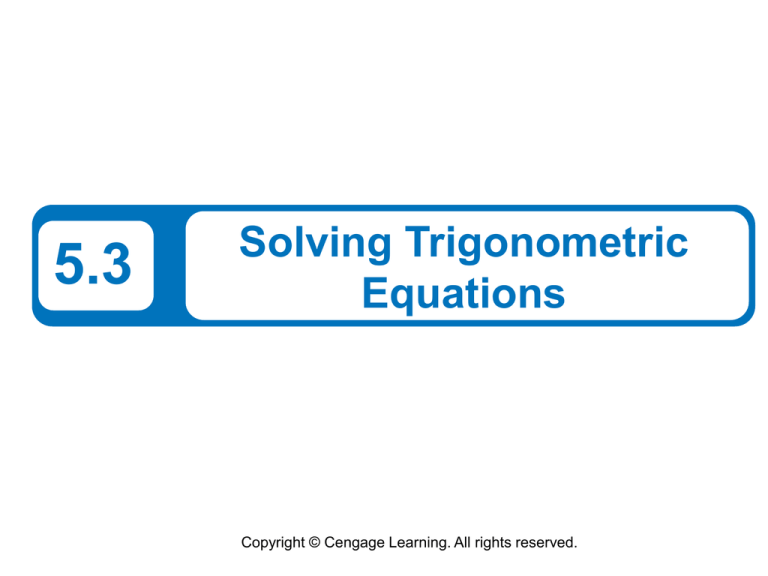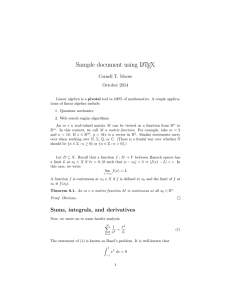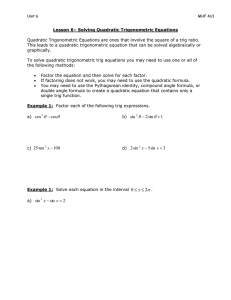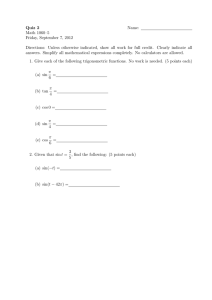
5.3
Solving Trigonometric
Equations
Copyright © Cengage Learning. All rights reserved.
What You Should Learn
•
•
•
•
Use standard algebraic techniques to solve
trigonometric equations.
Solve trigonometric equations of quadratic type.
Solve trigonometric equations involving multiple
angles.
Use inverse trigonometric functions to solve
trigonometric equations.
2
Introduction
3
Introduction
To solve a trigonometric equation, use standard algebraic
techniques such as collecting like terms and factoring.
Your preliminary goal is to isolate the trigonometric function
involved in the equation.
4
Example 1 – Solving a Trigonometric Equation
Solve 2 sin x – 1 = 0.
Solution:
2 sin x – 1 = 0
2 sin x = 1
sin x =
Copy this slide, but not the next.
Write original equation.
Add 1 to each side.
Divide each side by 2.
5
Example 1 – Solution
cont’d
To solve for x, note in Figure 5.4 that the equation sin x =
has solutions x = /6 and x = 5 /6 in the interval [0,2).
Figure 5.4
6
Example 1 – Solution
cont’d
Moreover, because sin x has a period of 2, there are
infinitely many other solutions, which can be written as
and
General solution
where n is an integer, as shown in Figure 5.4.
7
Equations of Quadratic Type
8
Equations of Quadratic Type
Many trigonometric equations are of quadratic type
ax2 + bx + c = 0, as shown below. To solve equations of
this type, factor the quadratic or, when factoring is not
possible, use the Quadratic Formula.
Quadratic in sin x
Quadratic in sec x
2 sin2 x – sin x – 1 = 0
sec2 x – 3 sec x – 2 = 0
(sin x)2 – sin x – 1 = 0
(sec x)2 – 3 sec x – 2 = 0
9
Example 5 – Factoring an Equation of Quadratic Type
Find all solutions of 2 sin2 x – sin x – 1 = 0 in the interval
[0, 2).
Solution:
Treating the equation as a quadratic in sin x and factoring
produces the following.
2 sin2 x – sin x – 1 = 0
(2 sin x + 1)(sin x – 1) = 0
Write original equation.
Factor.
10
Example 5 – Solution
cont’d
Setting each factor equal to zero, you obtain the following
solutions in the interval [0, 2).
2 sin x + 1 = 0
sin x =
and
sin x – 1 = 0
sin x = 1
11
Functions Involving Multiple Angles
12
Functions Involving Multiple Angles
The next example involves trigonometric functions of
multiple angles of the forms sin ku and cos ku.
To solve equations of these forms, first solve the equation
for ku, then divide your result by k.
13
Example 8 – Functions Involving Multiple Angles
Solve 2 cos 3t – 1 = 0
Solution:
2 cos 3t – 1 = 0
2 cos 3t = 1
cos 3t =
Write original equation.
Add 1 to each side.
Divide each side by 2.
14
Example 8 – Solution
cont’d
In the interval [0, 2), you know that 3t = 3 and 3t = 53
are the only solutions. So in general, you have
3t =3 + 2n and 3t = 53 + 2n.
Dividing this result by 3, you obtain the general solution
and
General solution
where n is an integer. This
solution is confirmed
graphically in Figure 5.12.
Figure 5.12
15



